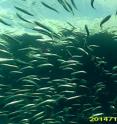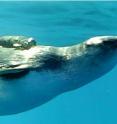Penguin cam captures hunt for prey
Little penguins were more likely to work together to hunt schooling prey than solitary prey, according to observations made using animal-borne cameras published Dec. 2, 2015 in the open-access journal PLOS ONE by Grace Sutton from the Deakin University, Australia, and colleagues. Group foraging in cooperative animals provides predators with advantages over prey, but for less cooperative colonial-breeding predators, like the little penguin, the benefits of group foraging are less clear due to the potential for competition between penguins. The authors of this study used animal-borne cameras on 21 little penguins from two breeding colonies in south-eastern Australia to determine the prey types, hunting strategies, and success of little penguins, a small, marine predator that extensively forages with other little penguins.
The researchers found that little penguins had a higher probability of associating with each other when hunting schooling prey than when encountering solitary prey. Surprisingly, individuals were no more successful at capturing schooling prey than solitary prey. However, success preying on schooling fish was similar or greater when individual penguins hunted on their own rather than together. The authors suggest that individual penguins may trade-off the potential benefits of solitary hunting to increase the probability of detecting prey by associating with other little penguins.
Grace Sutton says: "This study showed little penguins gained no benefit in capturing prey when from hunting in groups, suggesting individuals may forage in groups to improve detection of prey or avoid predation but, once they find prey, it is every penguin for themselves."
Source: PLOS
Other sources
- Penguin cam captures hunt for preyfrom Science DailyThu, 17 Dec 2015, 2:31:20 UTC
- Penguins On The Hunt - Attached Camera Captures Pursuit | Videofrom Live ScienceWed, 16 Dec 2015, 21:23:51 UTC
- Penguin Candid Camera: Little Birds Reveal Hunting Secretsfrom Live ScienceWed, 16 Dec 2015, 21:23:25 UTC
- Penguin cam captures hunt for preyfrom PhysorgWed, 16 Dec 2015, 20:01:24 UTC

